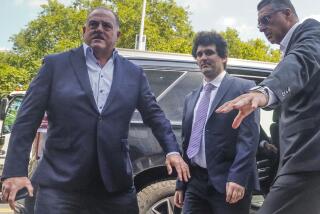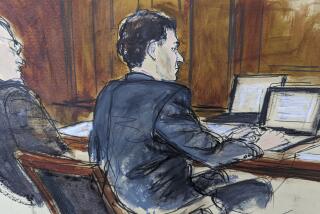Jury hears clashing accounts about ex-Broadcom officer
- Share via
Prosecutors on Friday portrayed a former Broadcom Corp. chief financial officer as a liar who conspired with co-founders Henry T. Nicholas III and Henry Samueli to hide billions of dollars in compensation from regulators and investors in the Irvine technology firm.
Rather than reward Broadcom’s microchip engineers with high salaries, the former financial executive, William J. Ruehle, schemed for years to improperly backdate stock options, giving them extra value that wasn’t acknowledged, because “every dollar you pay is one less dollar on the bottom line,” Assistant U.S. Atty. Andrew Stolper told a federal jury in Santa Ana.
Ruehle’s lawyer countered by portraying the gray-haired, bespectacled defendant as a stickler for proper accounting who was admired by Wall Street and employees.
Defense attorney Richard Marmaro said Ruehle made the same innocent errors as did executives at 200 other companies before the rules governing stock option awards were clarified in the middle of this decade.
“Why are we here?” Marmaro asked in his opening statement. “It’s not because he’s a criminal, because he’s not. We’re here because this is a case involving two simple words: then versus now.”
Ruehle, 67, has pleaded not guilty to 14 counts of fraud, conspiracy, falsifying Broadcom’s books and lying to auditors and securities regulators. He sat quietly in a navy suit, blue shirt and red tie, occasionally taking notes on a legal pad as the attorneys addressed the jurors.
Nicholas, one of Broadcom’s two billionaire founders and its former chief executive, also is awaiting trial on fraud and conspiracy charges. He has pleaded not guilty in the option-backdating case and a separate federal case accusing him of furnishing drugs to associates.
The other company founder, Samueli -- a former Broadcom chairman who owns the Anaheim Ducks hockey team, has pleaded guilty to lying to securities regulators about his role in issuing the options. He is to be sentenced after Ruehle’s and Nicholas’ cases are resolved.
U.S. District Judge Cormac J. Carney rejected a plea bargain that Samueli struck with prosecutors, which would have guaranteed the tech wizard no prison time after he paid an unusual $12-million fine.
Attorneys for Nicholas and Samueli, who looked on in the courtroom Friday, declined to comment on the trial.
The dating of options attracted the interest of prosecutors after academic studies showed that scores of companies, particularly in the technology field, had awarded options dated retroactively to times when the firms’ share prices were at low points.
Options are rights to buy shares of a company’s stock for a certain period of time at a specific price, usually set at the stock’s market price the day the options are granted. The practice of backdating options boosted their value to the employees who received them.
After authorities began investigating the practice, many companies were forced to restate previous financial reports to increase their option-related compensation expenses.
Broadcom added $2.2 billion to its compensation costs, making the largest such adjustment among the roughly 200 companies caught up in the scandals.
In Broadcom’s case, prosecutors said Friday, backdating amounted to fraud because shareholders weren’t told of the practice, the company’s earnings were falsely inflated and the chip maker was underpaid when employees cashed in their options.
Based on the presentations Friday, the jury will be immersed in accounting issues and be asked to evaluate numerous charts and e-mails during the trial, which according to the judge is expected to last two months.
Stolper said the evidence showed that Ruehle was part of a carefully engineered conspiracy that, among other things, enabled him to cash in $77 million in stock options of his own.
But Marmaro said he would present evidence showing that it was common for companies to exercise flexibility in picking option-grant dates in the 1990s and early this decade, the period in which Ruehle is accused of wrongdoing.
Option backdating, Marmaro said, stemmed from a widespread misreading of 1972 accounting guidelines and wasn’t clearly defined as improper until late 2005.
The defense lawyer also said that many of the e-mails that Stolper depicted as incriminating evidence were actually innocent attempts to force Nicholas, a boss known for delaying important decisions, to finalize option grants so they could be processed and awarded.
“Witness after witness will say [Ruehle] always tried to do the right thing, that he always tried to get the accounting right,” Marmaro said.
--







